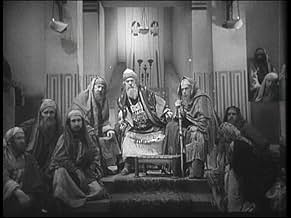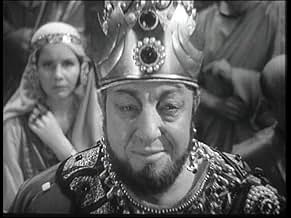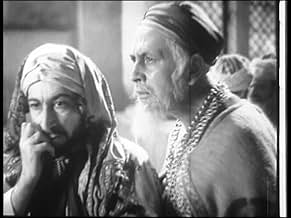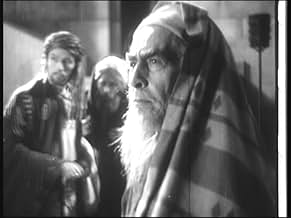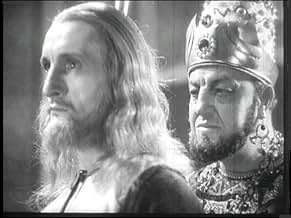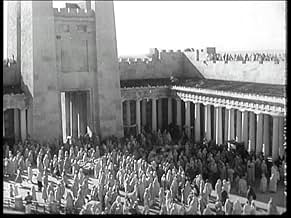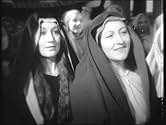Agrega una trama en tu idiomaThe final days of Jesus from the time he enters the city of Jerusalem. Viewed as a threat, it is decided that he must be captured, tried, and executed as a criminal, a plan aided and abetted... Leer todoThe final days of Jesus from the time he enters the city of Jerusalem. Viewed as a threat, it is decided that he must be captured, tried, and executed as a criminal, a plan aided and abetted by disciple Judas Iscariot.The final days of Jesus from the time he enters the city of Jerusalem. Viewed as a threat, it is decided that he must be captured, tried, and executed as a criminal, a plan aided and abetted by disciple Judas Iscariot.
- Dirección
- Guionista
- Elenco
- Premios
- 1 premio ganado en total
André Bacqué
- Anne
- (as Andre Bacque)
Hubert Prélier
- Pierre
- (as Hubert Prelier)
Edmond Van Daële
- Gerson
- (as Van Daele)
Marcel Chabrier
- Joseph d'Arimathie
- (as Chabrier)
Georges Saillard
- Un Sanhédrite
- (as Saillard)
François Viguier
- Un Sanhédrite
- (as Viguier)
Maurice Lagrenée
- Philippe
- (as Maurice Lagrenee)
- Dirección
- Guionista
- Todo el elenco y el equipo
- Producción, taquilla y más en IMDbPro
Opiniones destacadas
The scale of the production is impressive, especially in the humongous crowd scenes and the climactic thunderstorm effects. But the script is just ticking off familiar boxes ✔. Jean Gabin has one of his earliest - and oddest - parts as Pontius Pilate. The actor who played Jesus looked too old for the role in closeups....although an IMDb search confirms he was indeed just 35 at the time. **1/2 out of 4.
10clanciai
What makes this film of paramount interest is the way Duvivier gives the lead of the film to the crowds. The two greatest scenes are the triumphant entry of Jesus into Jerusalem, probably the best screening of that event ever, and the Golgotha scene of the passage to the crucifixion. In both scenes the crowd takes over the film entirely while the leading characters are almost swept away as elements of minor importance, they somehow get lost and become only supporting actors to the great movement of the crowd. The way this is filmed is monumentally impressive, Duvivier actually has the crowds in his command, and everything seems perfectly natural, as if it happened in the present moment of this almost documentary journalist filming. It has been pointed out that this film is the forerunner to both Pasolini's "Gospel of St. Matthew" and Mel Gibson's gory splatter version of the passion, while this is more realistic without exaggerations and with a much more convincing Christ than Pasolini's callous revolutionary. It is actually striking how much this Christ looks exactly like the image on the shroud of Turin, as if Duvivier had tried to get as close to that as possible - I don't know if that was Duvivier's intention, but it seems almost likely. Jacques Ibert's great music plays the other lead, resounding throughout the film, with great breathtaking pauses for special more intimate scenes, and very appropriately he uses the ancient Latin anthem "Dies irae", used by so many composers, for the Golgotha scene. In brief, the whole film is monumentally impressive and much more striking and convincing than almost all the others.
There are a countless movies over the Jesus's life, instead this one is applying just in his final days after the triumphal arrival in Jerusalem and his trial told under Matthew's gospel, strangely just four gospels accepted in the bible have some differents versions, each one has a little disagreement, easily understandable of course, these old testimonies were put together centuries ahead, this great french production is really fine, a little sins as the Jerusalem's architecture is based in Egyptian's large buildings otherwise is almost perfect, Robert Le Vigan as Jesus and a still young Jean Gabin as Ponce Pilatos were flawless!!!
Resume:
First watch: 2018 / How many: 1 / Source: DVD / Rating: 8.25
Resume:
First watch: 2018 / How many: 1 / Source: DVD / Rating: 8.25
Duvivier's story of the Passion is badly thought of in its native country."Ridiculous ,a film that should never have been made,rubbish,you name it".
When today you try to see what is good and what is bad in this movie,this is easy.
What is definitely bad:the choice of the actors.Le Vigan is closer to Rasputin than to Christ.His hoarse voice has nothing to fascinate the crowds and his beard....well if you cannot say something nice..And what about Gabin's Pilate? Gabin's Parisian accent is guaranteed to net nothing but horse -laugh.OK ,Claudia (Edwige Feuillère) tells her hubby he was nurtured in the plebeian milieu,but this is probably the actor's worst part in the golden thirties -shall I have to add that Gabin is THE French actor of that era,if not of the whole French cinema.
But all that remains is splendid indeed and did not deserve such a contempt:the cinematography is wonderful ;two examples :the three crosses ,climbing up the Golgotha ,or Judas 's death ,seen from a distance .Aerial pictures of Jerusalem already display Duvivier's sense of space which will be used to even better effects in his celebrated "Pepe le Moko" .The movements in the crowd compare favorably with the best of the epics of those ancient times such as Fred Niblo's "Ben Hur" (1925).The forty lashes scene ,which the populace intently watches behind the bars ,is not out of place in a Duvivier movie:nobody in France depicted human wickedness like he did.
The political side of the story is not passed over in silence either: Judas's motivations ,at the beck and call of the Sanhedrin ,Herode's scene (Unlike Gabin and Le Vigan, Harry Baur is well cast as the king and however his appearance does not exceed five minutes).
In the end what is good outshines what is bad.
When today you try to see what is good and what is bad in this movie,this is easy.
What is definitely bad:the choice of the actors.Le Vigan is closer to Rasputin than to Christ.His hoarse voice has nothing to fascinate the crowds and his beard....well if you cannot say something nice..And what about Gabin's Pilate? Gabin's Parisian accent is guaranteed to net nothing but horse -laugh.OK ,Claudia (Edwige Feuillère) tells her hubby he was nurtured in the plebeian milieu,but this is probably the actor's worst part in the golden thirties -shall I have to add that Gabin is THE French actor of that era,if not of the whole French cinema.
But all that remains is splendid indeed and did not deserve such a contempt:the cinematography is wonderful ;two examples :the three crosses ,climbing up the Golgotha ,or Judas 's death ,seen from a distance .Aerial pictures of Jerusalem already display Duvivier's sense of space which will be used to even better effects in his celebrated "Pepe le Moko" .The movements in the crowd compare favorably with the best of the epics of those ancient times such as Fred Niblo's "Ben Hur" (1925).The forty lashes scene ,which the populace intently watches behind the bars ,is not out of place in a Duvivier movie:nobody in France depicted human wickedness like he did.
The political side of the story is not passed over in silence either: Judas's motivations ,at the beck and call of the Sanhedrin ,Herode's scene (Unlike Gabin and Le Vigan, Harry Baur is well cast as the king and however his appearance does not exceed five minutes).
In the end what is good outshines what is bad.
It is a profound special film. Seductive for cinematography and for wise solutions for few moments of the story, for details and for the nuances brilliant explored. It seems be the grandfather of Gospel of Matthew by Pasolini and source of inspiration for the Passion of Christ by Mel Gibson. Its sins, after decades and decades, are insignificant. The admiration for Jean Gabin is not touched by his Pilat of Pont, Robert le Vigan is, maybe, not the expected option for Jesus , but a decent one and the presence of Juliette Verneuil as Mary and Harry Baur as Herod are a precious gift, The entry in Jerusalem is real great. A beautiful architecture, a splendid result.
¿Sabías que…?
- TriviaThe first sound film made about the life of Jesus Christ, although it only covers Palm Sunday, the Passion, and the Resurrection.
- ErroresThe Crucifixion scene in the film is totally wrong as the men nailing Jesus to cross are not Roman Soldiers but Jews from the crowd.
- Créditos curiososThe cast list in the opening credits is read out by an off-screen voice. It lists the actors as follows: Harry Baur, Jean Gabin, Edwige Feuillère, Charles Granval, André Bacqué, Lucas Gridoux, Hubert Prélier, Juliette Verneuil and finally Robert Le Vigan as Jesus.
- Versiones alternativasAn abridged version runs about 45 minutes, and omits the entire Last Supper sequence, among other scenes.
- ConexionesFeatured in Jesus Christ, Movie Star (1992)
Selecciones populares
Inicia sesión para calificar y agrega a la lista de videos para obtener recomendaciones personalizadas
Detalles
- Tiempo de ejecución
- 1h 35min(95 min)
- Color
- Relación de aspecto
- 1.37 : 1
Contribuir a esta página
Sugiere una edición o agrega el contenido que falta

